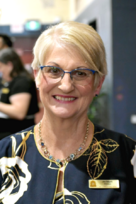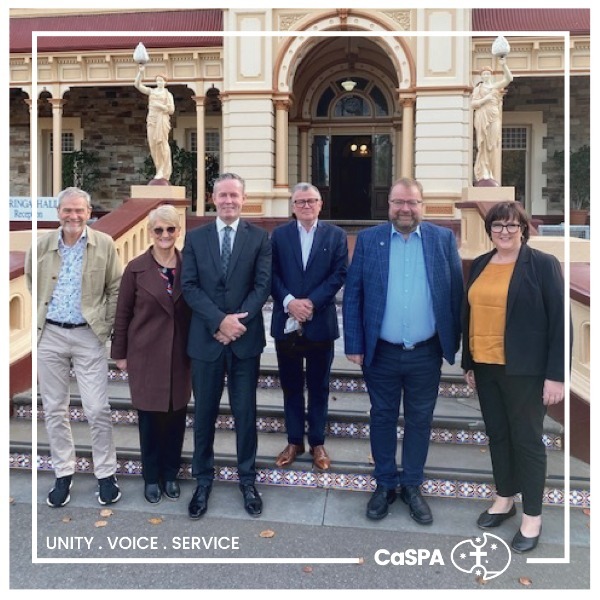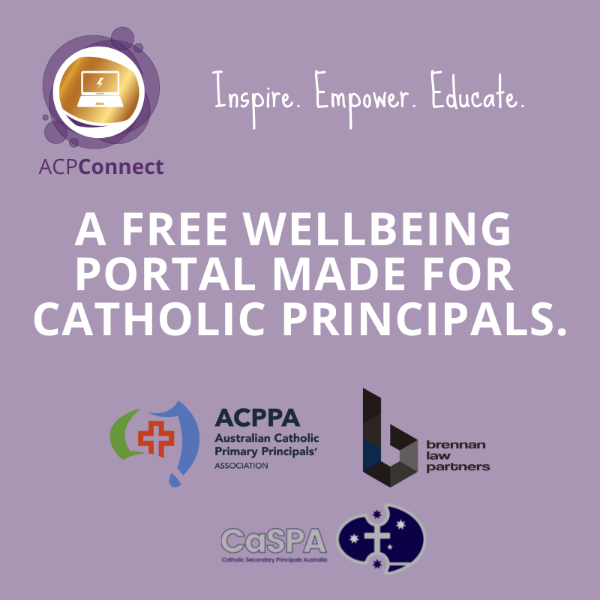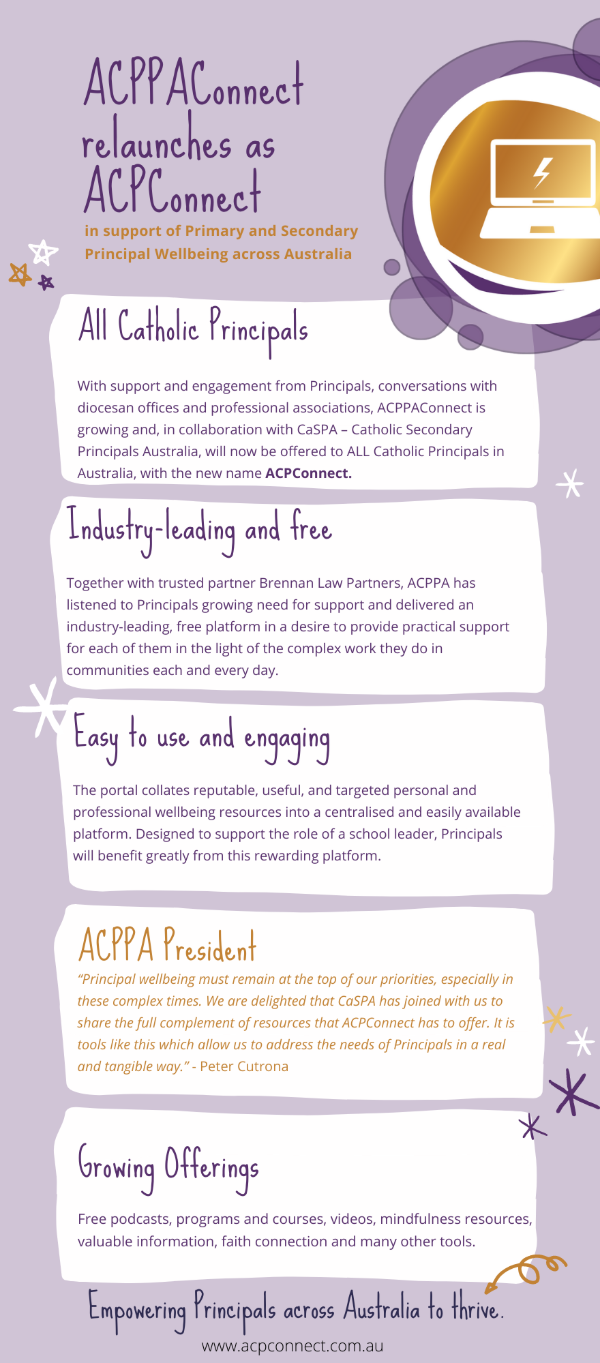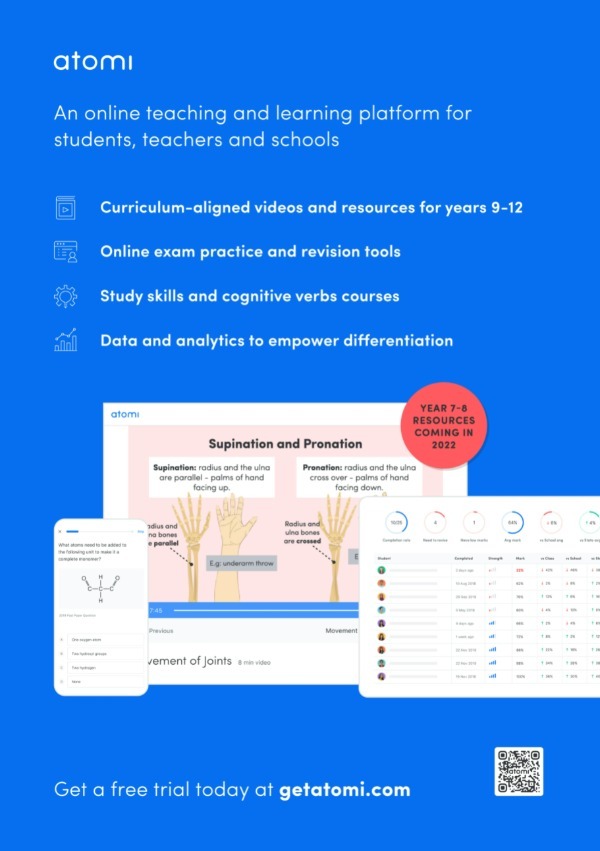June 2022 Newsletter
-
President's Message
-
NEW Platinum Business Partner - Box Of Books
-
CaSPA Board Update
-
PSW - Platinum Partner
-
CaSPA Latest News
-
2022 CaSPA National Conference
-
The School Photographer - Platinum Partner
-
ALP Response to CaSPA Election Letter
-
NGS Super - Platinum Partner
-
Article: Crisis Leadership, Absurd Workloads and Unacceptable Violence
-
Woods Furniture - Platinum Partner
-
ACPConnect
-
HALT Summit: Building Momentum with Australia's Expert Teachers
-
Atomi - Gold Partner
-
Australian Education under a Labor Government
-
Rory's - Gold Partner
-
Education Horizons - Silver Partner
-
FujiFilm - Silver Partner
-
CCI - Silver Partner
-
INSTALLING THE SZAPP
Dear Colleagues
I hope Term 2 is going well for you and your community.
There has been much happening in May especially with the recent federal election as you would be aware. During the election campaign CaSPA wrote to both major Parties outlining key priorities as published in last month’s newsletter. Recently a reply was received from the Labor Party, which can be read in this edition. No reply was received from the previous Prime Minister and Cabinet. CaSPA looks forward to liaising with the new Government and Education Minister in the future.
CaSPA also looks forward to working with the Coalition of Australian Principals (CAP) in consulting with the new Minister to provide a Principal Stakeholder Voice into education policy in Australia.
CaSPA was recently invited to participate in AITSL’s HALT Summit in Adelaide. It was a wonderful experience to hear the experiences and achievements of the HALTs form around Australia. The Summit was also a great opportunity for national Principal Associations and Systems to provide feedback to AITSL regarding strategies related to the Australian Teacher Workforce Data, ITE and strategies to increase the number of HALT applications and certifications. The feedback suggested some possible HALT alterations for AITSL’s consideration:
- Provide multiple pathways to achieve HALT
- Consider salary incentives consistent across all sectors
- Link HALT to a post graduate degree achievement
- Define the role of HALTs in schools
CaSPA will continue to collaborate with Government agencies to provide practitioner input and advocating on behalf of Catholic Principals. In the meantime we have written to the Jason Clare and congratulated him on his appointment as Minister for Education. Hopefully CaSPA will be able to organise a meeting with the Minister in the near future. At the recent CaSPA Board meeting at Sacred Heart College the CaSPA Directors discussed a number of key issues: teacher shortages, status of the profession, Principal well-being, rural and remote recruitment and equity issues. It will be wonderful if we can discuss these issues with the Minister.
I hope you will be able to take some time in the coming weeks to register for the 2022 CaSPA Conference. I look forward to meeting you and your team at our collegial event in Canberra. https://consec.eventsair.com/caspa-2022/registration
Blessings to All
Ann Rebgetz
After 2 years of Zoom Meetings, it was a great experience for the CaSPA Board to meet in person at Sacred Heart College in Adelaide.
Box of Books is Transforming the Classroom
We deliver ebooks and digital resources, provision publisher interactive accounts, ship physical textbooks and stationery, and work hard to keep leading schools at the forefront of digital learning.
Box of Books is a versatile digital solution which provides you with content from publishers, digital services and physical suppliers from all around the world. We integrate seamlessly into your school’s digital strategy, your learning management system and any other technology you use. We are used in over 150 schools across Australia and even more internationally.
To find out more visit us at www.boxofbooks.com.au or contact us on hello@boxofbooks.io
- Decisions made for 2022 CaSPA Award winners to be presented at the Canberra Conference.
- Conference Planning continuing Event Organisers (Consec).
- Providing feedback to AITSL regarding ITE Review.
- CaSPA Board Meeting (23 & 24 May) hosted by Sacred Heart College, Somerton Park, SA.
- Miriam Rose (Northern Territory) creating the First Nations artwork commissioned by CaSPA.
- CAP Meeting 18 May to discuss post-election connect with the Education Minister and develop HALT feedback for AITSL and a response to the ITE Review.
Profiles of all the CaSPA Board are available on the CaSPA Website: https://caspa.schoolzineplus.com/current-and-past-board-members
- Ongoing promotion of ACP Connect App and Website - https://acpconnect.com.au/
- Ongoing CaSPA Conference Registration - Early Bird promotion - https://consec.eventsair.com/caspa-2022/registration
- Meeting with Associations Forum to discuss CaSPA’s ongoing membership and benefits.
- Consulting with University of Melbourne re “Schools as Community Hubs Study”.
- Establish agreement with new Partners – Box of Books
- Meeting with Athas Concepts in Melbourne to finalise Data Project 2022 and Conference logistics.
- Prepare Award Certificates with Brighton Trophy Centre
- Meetings with potential organisations (Tatu & Neil Carrington) to facilitate the 2023 – 2025 CaSPA Strategic Plan in September this year.
- Letters to both Major Parties
- Liaising with International Confederation of Principals (ICP) Regional Council meeting in Singapore this September.
After two years of restrictions related to meeting in person, the CaSPA Board is delighted to invite you and your leadership team to join us for a collegial CaSPA Conference in Canberra.
Please click on the link to complete your registration. https://consec.eventsair.com/caspa-2022/registration
See our conference program below:

Crisis leadership, absurd workloads and 'unacceptable' violence: Expert speaks out for principals
By Sarah Duggan
Published March 24, 2022
Dr Paul Kidson believes it’s not just time to call out the monstrous workloads, intense emotional demands and unacceptable rates of bullying and violence that we know are grinding down the psychological health of Australian school leaders – it’s time for positive, collective action.
Dr Paul Kidson is calling for systemic change to better address the growing demands school leaders face in their roles.
A former independent school principal, Kidson has found himself at the investigative end of the latest Australian Principal Occupational Health & Wellbeing Survey, a report which provides one of the most comprehensive longitudinal data sets of school leader health and wellbeing in the world.
Since 2011, the survey has unearthed waves of concerning figures – numerical brushstrokes which have cast a bleak picture of the internal state of those running our schools.
'Crisis level management'
The 2021 report was no exception, finding principals are more stressed and burnt out than ever, with nearly a third flagged as being at significant risk of serious ill-health.
Kidson says some school leaders are now well into their third year of operating under “crisis level management” after catastrophic fires, floods and the COVID pandemic upended their communities.
“…it's kind of reasonable at that stage, just at a human level, that you go, 'Oh man, I can’t do this,'” the senior lecturer of educational leadership from Australian Catholic University (ACU) says.
“And yet, on the contrary, that commitment to their work, the value they find in it, their engagement with parents, has stayed either stable and/or increased.”
This latest research wanted to go beyond statistics to illuminate the actual voices of principals and deputy leaders, Kidson adds.
Personal accounts of their thorniest challenges and professional dilemmas are littered throughout the report.
One Territorian principal wrote:
“I choose to live and work where I do because I am passionate about equity of education for all, but COVID and other demands on Educational Leaders result in exhaustion and not a lot of ways to refill the bucket. I know a lot of my colleagues are running on less than empty and merely surviving (I often feel this way myself). The new normal needs to see the letting go of obsolete, repetitive, time wasting demands made on educational leaders and educators, or we will see good people leaving the profession in droves. Recruitment and retention are going to be challenging going forward (they already are in our location, but I predict it is going to be worse across the country and world).”
Kidson says there is “something inherent” in the nature of people who want to become a school principal; they are driven to serve and to care.
“And that's what has consistently come through, not only in that hard quantitative data but the qualitative comments as well…
“They consistently say, ‘I really love my community, I really want good things for it’, and I do think that's integral to the nature of people who seek school principal leadership – most people don’t go into education to make a million dollars.
"The heart and soul of a community is what attracts and maintains their contribution and commitment to it, and that absolutely should be celebrated because [that’s exactly what] they've done.”
Nevertheless, the researcher indicates this need to ‘do good’ might actually compel school leaders to sacrifice their own health and wellbeing for that of their staff and students. On this front Kidson says he and his colleagues are “very concerned”.
“There's no question about it, if you get that number of red flags that is a real concern about the sustainability of this work.
“There are a couple of aspects to this that I think we really need to be clear about: crisis leadership is tough work. And the types of crisis leadership that principals and deputy principals have shown has been sustained.
“In Victoria and New South Wales, for example, some of those school leaders were running communities in remote mode for in excess of 10 weeks … That's really major, emotionally draining work.
"So in one regard, it's not acceptable, but it's understandable because that DNA of leadership that wants to be serving and generously so, has been given at the expense of their own health. That's both to be applauded and [of real worry].”
Workload pressures mount
The report found school leaders work an average of 55.6 hours per week, with 74.7 per cent clocking up more than 50 hours and 25.7 per cent working more than 60 hours per week.
The number one source of stress for school leaders was the sheer quantity of work they face, with notable frustration over the intensifying amount of compliance tasks that do not improve student learning.
The report flags the need for a “national conversation with system and school leaders to develop comprehensive reform of the role” to address this.
“We see in those those qualitative comments time and time again: administrative and bureaucratic tasks that have little or no direct student focus and impact, that's the main source of stress for them,” Kidson says.
“We also rank 19 sources of stress and the one that jumped highest, it jumped five ranking positions, was teacher shortages.”
A recent report from libertarian think thank The Centre for Independent studies concluded there is no overall teacher shortage in Australia.
The report angered the Australian Education Union (AEU), with federal president Correna Haythorpe arguing that facts had been “cherry-picked and misrepresented to suit personal narratives throughout”.
Kidson says the teacher shortage crisis upon us is “unambiguous”.
“It astounds me that ministers on the one hand say, ‘We've got a teacher workforce strategy that we're looking to and we want better outcomes, but no, there's not teacher shortages’.
“I don't know what world [they’re in], because it's unambiguous … and the NSW Government has already got a document showing that they’ve got teacher shortages – Queanbeyan High School has been having to close because they literally cannot get teachers.
“…if you can't even get people to be [at school], that is a major source of stress and it’s no wonder it’s gone up so highly in terms of the ranking.”
Red Flags aplenty
The report found 29 per cent of school leaders received a ‘Red Flag’ notification last year – an immediate alert sent to those whose survey responses indicated their health and wellbeing was at risk.
Kidson says a number of “triggers” had to line up before a Red Flag was sent.
“It's a warning sign. Like anything in your car, you're better off to pay attention to the red light on your dashboard rather than not. You're not necessarily going to have your engine blow up today, but if don't do anything about it, it probably will – and that's the purpose of those red flag triggers.
“That they are as high as they are, it is absolutely a concern. Understandable, but still a concern. What we can do about it, however, goes to the core of this issue of what lies underneath the COVID crisis management.
“COVID will go, it will resolve, but some of the stresses that they are reporting are systemic and have been here for a few years and they are not reducing…”
Interestingly, the biggest risk factor for school leaders was found to be age, with 40 per cent of those aged between 31 and 40 receiving a Red Flag, double the rate of their colleagues aged 61 and over.
Experience appeared to have much less impact, with 34 per cent of school leaders with under five years’ experience receiving a Red Flag, compared to 25 per cent of those with 21 or more years’ experience.
Kidson says that from his own professional experience, the reason why younger school leaders might be at greater risk of ill-health is due to the fact that they want to “show they can do it well”.
“And they are working so hard to do that, and they haven’t got enough 'runs on the board' to ease up a bit.”
The researcher notes “downward pressure” from government adds fuel to the fire.
“If I’m a principal in my second year of trying to turn a school around that might have been struggling, already underperforming, I'm so driven because what happens if you don't get [those positive outcomes]? I'm going to get sacked. And that kind of unilateral policy divestment is really stretching principals.”
'We should be calling it out': violence and offensive behaviour
The survey showed minor declines in adult-on-adult bullying, threats of violence, and actual violence experienced by school leaders – but rates remain high and significantly more than those of the general population.
Eighty-four per cent of school leaders reported being exposed to at least one form of offensive behaviour last year, including sexual harassment, threats of violence, bullying, unpleasant teasing, conflicts and quarrels, gossip and slander and cyber bullying.
“Government policies to support principals are only part of the solution. Some wider community members need to change personal and online behaviour towards principals,” the report warns.
Kidson wants to set a few points straight here.
“One of the one of the things that we've been wanting to say, is that's absolutely unacceptable behaviour in any workplace – it doesn't matter what the workplace is. Schools are communities who are open, inclusive, and welcoming. And unfortunately, some people take advantage of that in ways that you can't do anywhere else in our society.
“I can't go and order a beer at an RSL club and speak to someone (offensively) like that. We just don't, and we should be calling it out and saying it's unacceptable…”
“We've just got to break this notion. Parents and caregivers are passionate and committed and dedicated to the needs and wants and desires of the kids, we get that strongly, but that is not the excuse to be able to then mistreat, to be disrespectful, to lack curtesy.
“What type of example does actually set for children and young people? A pretty poor one.”
The researcher says that during his time as a school principal he had to have parents physically removed from campus.
“I've physically been intimidated to the point where one of my senior executives thought I was literally going [to get punched out].
“I've had people banging on my desk, thumping the desk in my office, and again I just kind of go 'Well, I understand why I'm having some challenges with your kids.'”
Kidson is pleased the survey has been able to highlight and affirm just how valuable school leaders are to our nation.
“Our data says principals are getting low in a tank. That's why I say our concern is not that they've done this great leadership, but it's for how long can they sustain that…”
“One of the major [changes] we would love to see is a genuine, active, open engagement with school leaders and politicians and bureaucrats. The consistent call that comes out … is they are saying they just feel as if it's a one-way flow of information.
“If things need to change in schools, who are some of the best placed people to give advice about that? The people that run them.
“There are too many instances of that being done downwards, unilaterally from the department to schools, and schools just have to implement [the policy].
“The principalship is a significant community resource and we need to protect and care and nurture them so that they can continue to do [their important work] for many years to come.”
(Source: EducationHQ.com)

CaSPA is delighted to announce a partnership with ACPPA to launch the Principal Well-being App - ACPConnect. You will have received an invitation to login to the App. Please check your Inbox and Junk Box for the invitation.
With the concerning statistics that have come to light since the Principal Occupational Health and Wellbeing Survey began 11 years ago, it is vital that we work together to provide action and practical tools about principal well-being.
This free health and wellbeing portal is for all Catholic Primary and Secondary Principals across Australia.
Every Principal should have received a personal login to begin accessing resources relevant to them.
Check out the ACPConnect homepage: https://acpconnect.com.au/
More than 300 expert teachers from across Australia gathering to be part of the sixth Highly Accomplished and Lead Teacher (HALT) Summit.
The two-day event saw HALTs, senior representatives from systems, sectors, and regulatory authorities from across Australia come together in person and online. Together, attendees shared and explored bold concepts to build and sustain momentum in how we think, teach and lead.
Recognising the key role of school and educational leaders in identifying, supporting, and utilising the expertise of their teachers, this year we extended the invitation for leaders of HALTs to attend virtually.
One of this year’s keynote speakers was Derek Scott, Principal of Haileybury and the Chair of the Australian Curriculum, Assessment and Reporting Authority (ACARA). Derek encouraged HALTs to become leaders and change agents not only within their schools, but also influence education policy including in initial teacher education.
Participants also worked with other leading educational thinkers, including:
- Emeritus Laureate Professor John Hattie, Chair, AITSL.
- Danielle Toon, Director, Evidence for Learning, Social Ventures Australia
- Julie Sonnemann, former Deputy Program Director, Grattan Institute
- John Cole, Highly Accomplished teacher, St John Paul II College, ACT
- James Ellis, Lead teacher
- Lisa Paul, Chair, Quality Initial Teacher Review panel and former Secretary, Federal Department of Education
There are 1025 teachers who have HALT certification, nationally, and this is growing. On the day after the Summit closed, NSW’s Minister for Education and Early Learning, Minister Mitchell, announced a commitment to increase NSW HALT numbers ten-fold to 2,500 by 2025. This really shows how we are Building Momentum!
Having more teachers certified at the Highly Accomplished and Lead teacher career stages isn’t just good for Australian students, but for the teaching profession as well. The more expert teachers we have, the more their colleagues have opportunities to learn, and the more the status of the teaching profession will grow.
Australian education takes new trajectory under a Labor government
By EducationHQ News Team
Published May 23, 2022
As the nation’s 31st Prime Minister is sworn into office, Australian education is set to embark on a different trajectory under the new Labor government.
In his victory speech on Saturday night, Party leader Anthony Albanese said he hoped incoming generations would be able to aspire to greatness regardless of the circumstances they came from.
"It says a lot about our great country that a son of a single mum who was a disability pensioner, who grew up in public housing down the road in Camperdown can stand before you tonight as Australia's prime minister," Albanese said.
"Every parent wants more for the next generation than they had. My mother dreamt of a better life for me. And I hope that my journey in life inspires Australians to reach for the stars.”
Having previously declared education the “biggest and most powerful weapon we have against disadvantage,” a pre-election promise saw Albanese commit to a $440 million Schools Upgrade Fund that from 2023 will see public schools receive the same amount of funding for new buildings and facilities that independent schools receive.
Labor have also pledged to pay high achieving students up to $12,000 a year to study teaching as part of a policy to boost instructional quality.
The party have said they will work with states and territories to ensure teachers have “a better career path with more opportunities to become recognised and rewarded as experts” and pass on their skills to others, while remaining classroom teachers.
The plan will cost $146.5 million over four years.
In addition, the High Achieving Teacher Program will now be bolstered to allow 1500 professionals from other fields to retrain as teachers.
“…Labor’s plan will incentivise the best graduates to join the teaching profession, leading to a brighter future for our students and for the nation,” Albanese said earlier this month.
Tanya Plibersek is expected to take up the education portfolio. Speaking on Channel 7’s Sunrise this morning, Plibersek said the election result had “very clearly shown” that people had “voted for decency, they voted for an end to the bickering”.
“…The other really big message from this election is the role of women in Australia as voters and as candidates. I think for the first time our government will be more than half female … on current projections,” she said.
Plibersek has flagged lifting teaching standards as “one of the most important things” we can do to stop Australian students’ declining academic achievement.
“I want students competing to get into teaching like they do to get into medicine or law.
“If we want a better future in Australia, we need a smart, skilled workforce so we can compete for jobs and growth with our neighbours,” she said earlier this month.
The Australian Education Union has welcomed the incoming Government. Federal president Correna Haythorpe said she was looking forward to working with the new Prime Minister and his team to address a ‘decade of public education neglect’.
“The outgoing Coalition government has been systematically undermining public schools, preschools and TAFE for almost a decade. Yesterday, Australians said no more.
“This is a vote of confidence in preschools, public schools and TAFE, and it’s a vote of confidence in the fundamental principle of equity in education.”
Haythorpe said she also looked forward to working with Labor to bring public school funding up to a minimum of 100 percent of the Schooling Resource Standard ‘as soon as possible’.
Labor has also vowed LGBTQIA students will be protected under their leadership, amid re-emerging debate in the lead up to the election around the outgoing Liberal Government's proposed religious discrimination laws.
Plibersek said any proposal to amend the Sex Discrimination Act would be done in the standard way.
"We have been consistently clear that we don't want to see any child discriminated against," she said.
"If we form government we will consult widely on the legislation. We don't want to do what Scott Morrison has done, which is divide the nation by introducing this type of legislation."
Religious discrimination laws were a key campaign commitment from the coalition at the 2019 election.
However, plans to legislate were stymied when five Liberal MPs crossed the floor of parliament earlier this year to protect LGBTQIA students.
Mark Spencer, Director of Public Policy at Christian Schools Australia, said when it came to their position on religious freedoms, Labor had “listened and learned from the results of the 2019 election”.
“Key ALP leaders, such as Senator Deborah O’Neill, have worked tirelessly to understand and reflect the needs of faith communities,” Spencer said.
“Many people of faith have put their trust in the ALP when they wouldn’t have done so in 2019.”
Spencer said people of faith would now be looking for the new Government to “deliver robust protections for religious freedom” and called on Labor to “act on the basis of principle” and work towards passing the Religious Discrimination Bill 2022 before Christmas.
“There is considerable frustration with the major parties, and ‘politics’ more broadly”, he said.
“…We have a clear benchmark for religious freedom protections. The Bill which passed earlier this year has broad support, both within Parliament and within the broader community.”
Yet professor Lucas Lixinski from UNSW Sydney noted that the fact that the Bill was shelved suggests it was only intended to enshrine a right to discriminate.
“The Bill is now shelved, reportedly because some Christian groups indicated that, without certain protections guaranteeing them the right to discriminate against LGBTIQ+ and other groups, the Bill did not go far enough for them,” he said in an interview.
“In my opinion, this change in support indicates that the Bill was never about protecting religious freedom. Instead, it was about enshrining a right to discriminate against others. Very few readings of religion require discrimination against others. Despite this, the Bill attempted to turn that idea into law.”
Also on Labor’s agenda is a $14 million plan to provide more schools with access to Indigenous language lessons.
Under the plan, 60 extra First Nations language teachers will be hired to provide lessons in local languages at the primary school level.
Senior Labor ministers are said to be already working to fulfil the Government's election promises.
"I look forward to leading a government that makes Australians proud," Albanese said.
"A government that doesn't seek to divide, that doesn't seek to have wedges, but seeks to bring people together for our common interest and our common purpose."
(Source EducationHQ.com)

